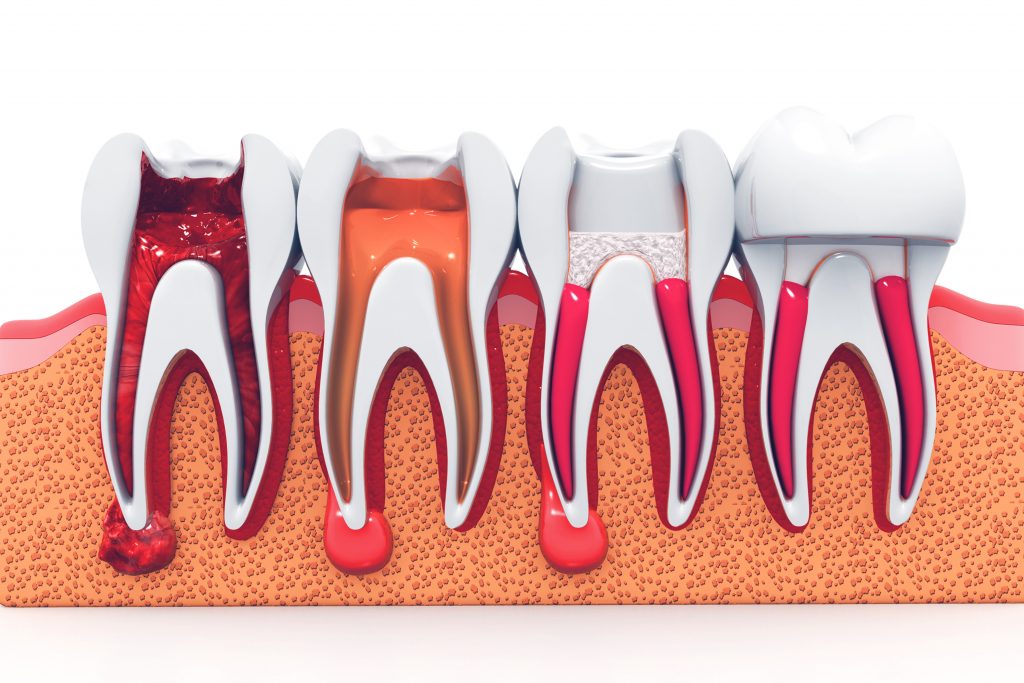Root Canals
Also known as Endodontic Therapy, a root canal is a procedure that Dr. Young performs to save an infected tooth that would otherwise require extraction. Root Canal is a phrase that frequently raises fear in a lot of people, though this is a misunderstood feeling. The root canal procedure does not cause pain but relieves it. Ask us at EQ Dental how a root canal can save a tooth and why we recommend it when necessary.
What does Endodontic mean?
Endodontic refers to the inside of your tooth. Endodontic Therapy is for the treatment of the pulp of a tooth.
Why do I need Endodontic Therapy?
When the pulp of your tooth becomes infected, there is nothing you can do without the help of a dentist to heal the infection. As the infection continues to rage, it will be painful, and will eventually kill the tooth. Dr. Young can help. There are many reasons that the inside portion of your teeth can become infected, all that is needed is a passage for bacteria.
Some ways that passage can occur includes:
- cavities that have extended into the pulp
- previous large fillings, which compromises the health of the tooth
- crowns, due to the natural tooth being decreased in size to accommodate the crown, and then bacteria finding its way between
- cracks or fractures in the tooth
- trauma due to an impact injury
- extreme wear from teeth grinding known as Bruxism
What is the Root Canal process?
In order for Dr. Young to be able to save the tooth, he needs to perform a Root Canal. During this procedure, he will remove the pulp, which includes the nerve and blood supply, and along with it, any bacteria or decay that is causing the infection is removed. With space now empty, Dr. Young cleans it, and fills it was a medicated rubber material known as gutta-percha. With the tooth now healed, depending on the placement of the tooth, Dr. Young may recommend a dental crown to add strength to the integrity of the natural tooth, because the tooth may become brittle.
 At times the tooth requiring treatment has a complex root or the infection is such that it needs a specialist, called an endodontist, to examine and complete root canal therapy. Thomas Young, DDS will work closely with our endodontic specialist to review your treatment case, send necessary records to their office, and place the crown after your root canal is completed. Our office staff will help coordinate your appointments and help you understand your financial responsibility.
At times the tooth requiring treatment has a complex root or the infection is such that it needs a specialist, called an endodontist, to examine and complete root canal therapy. Thomas Young, DDS will work closely with our endodontic specialist to review your treatment case, send necessary records to their office, and place the crown after your root canal is completed. Our office staff will help coordinate your appointments and help you understand your financial responsibility.
Does my tooth need the pulp?
During the development of the tooth, the pulp is very much so needed, it is there to grow the tooth. Once the permanent tooth is fully grown, it no longer needs the pulp.
Why should I get a Root Canal instead of Extracting the tooth?
Having a root canal done on a tooth is the treatment of choice to save a tooth. At EQ Dental, we always recommend taking the route to save a natural tooth structure. Extracting teeth causes long term issues, including affecting nearby teeth and bone loss at the extraction site, which will be more costly and time-consuming in the long run.
While root canal therapy has a high degree of success, it is not 100% guaranteed. It is very important to have a permanent restoration (usually a crown) placed within 30 days of the root canal. If a permanent restoration is not placed, the tooth can fracture or further decay to the point where the root canal must be re-done or, worse, the tooth must be removed.







